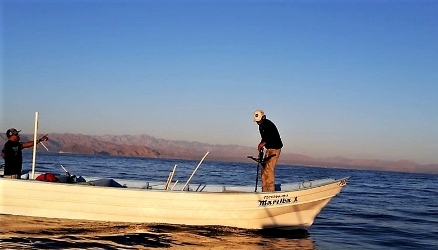Group wins national prize for removal of 'phantom nets'

Boats at the San Felipe dock preparing to set out in search of “ghost nets”. Click to enlarge. (Images: by Pesca ABC).
SAN FELIPE
The highest honors awarded for Ecosystem Restoration at the first national competition “Sharing Experiences to Cultivate Ideas” went to the local non-profit organization Pesca Alternativa de Baja California, or Pesca ABC.
Promoted by the Ministry of Environment and Natural Resources through the National Commission for Protected Natural Areas, the award ceremony was held on Oct. 30, 2019.
Cognizant of current socio-environmental problems, the fishermen of Pesca ABC have decided to organize to defend natural resources, the commercial fisheries in the area, and the vaquita porpoise (Phocoena sinus).
This highly endangered porpoise on the brink of extinction is endemic to the Upper Gulf of California and only found here. It is the most threatened of 128 species of cetaceans, is the smallest on the planet, and has the most restricted distribution.
The collapse of the vaquita porpoise’s population provoked the extension, as of this past March 5th, of a trade embargo on the importation of Mexican fish and seafood first imposed by the United States in 2018. In October, a committee from the Convention on International Trade in Endangered Species (CITES) will consider commercial sanctions against Mexico for not putting a halt to the illegal exportation of fish captured in gillnets that also results in the bycatch deaths of the marine mammals.
Since 2016, the members of Pesca ABC have engaged in activities geared towards preventing the mammal’s demise, utilizing a fact-based and forward-thinking approach to address the serious socioeconomic repercussions to Mexico of such an environmental disaster, all with the hope of guaranteeing the future of fishing in the Upper Gulf of California.
Through dozens of meetings, Pesca ABC established concrete actions to be carried out in collaboration with governmental institutions such as the Agricultural and Rural Development Ministry and the Environmental and Natural Resources Ministry, as well as the Baja California state government and civil society organizations. Conservation-minded fishermen took on the task of removing 'phantom nets' within the designated vaquita porpoise refuge, an area completely closed to fishing activities.
Phantom nets are fishing gear lost at sea or illegal nets left on the sea floor for poaching purposes within the vaquita porpoise refuge.
The joint work required the boating skills and knowledge of local fishermen to develop the tools that are still in use to this day for the removal of phantom nets. Their combined and sustained efforts have paid off: 655 nets have been removed in four years.
The project’s operation depends largely on limited resources from organizations and all three levels of government. Although this is a constraint, the fishermen have not given up on their conservation activities.
They have ample ongoing work, such as making “grampines,” anchors attached to a line and dragged by boats in order to detect ghost nets on the seabed. They also remove remnants of damaged nets and other artifacts that harm marine species.
In the midst of the socio-environmental conflict resulting from the struggle over natural resources, these fishermen, previously labeled as "poachers", have shown their commitment and willingness to protect the environment and save the area’s fisheries, thereby helping to avoid the further degradation of our country’s fishing industry.



